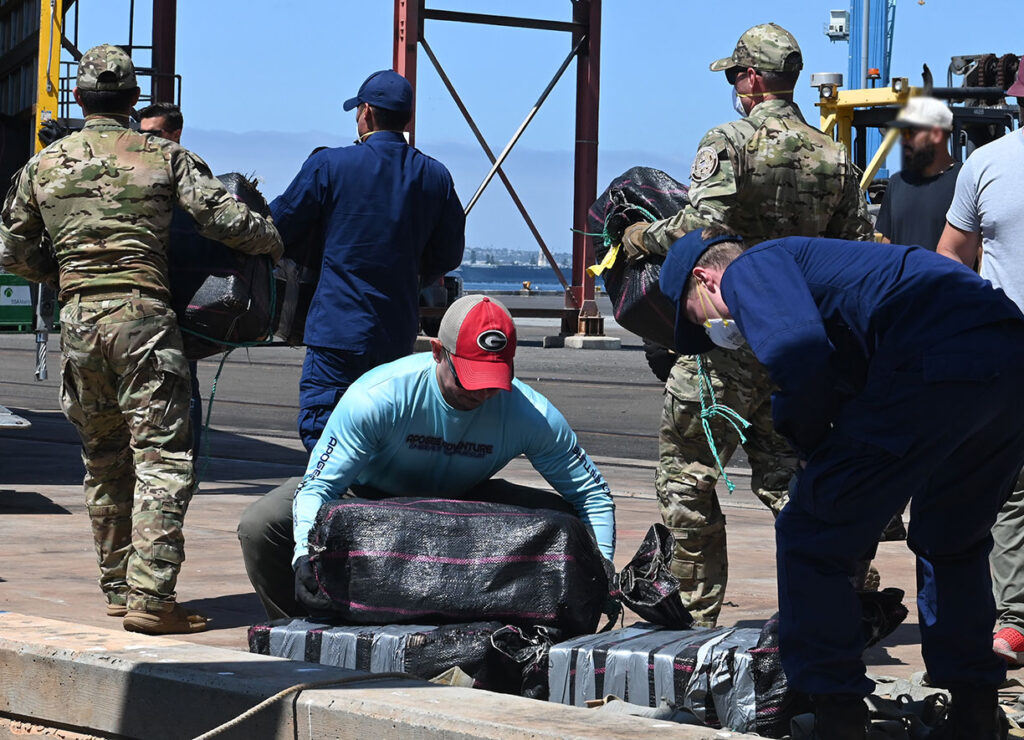Crew members from the HMCS Yellowknife transfer bales of cocaine from the ship to a pier in the Port of San Diego in September 2024. CHIEF PETTY OFFICER LEVI READ/U.S. COAST GUARD
THE WATCH STAFF
The Canadian coastal defense vessels HMCS Edmonton and Yellowknife returned to their home port of Esquimalt, British Columbia, in September after carrying out a massive cocaine interdiction while on a seven-week deployment in Central America as part of Operation Caribbe. The Yellowknife’s crew, along with U.S. Coast Guard officers, seized about 1,400 kilograms of cocaine with an estimated street value of $60 million Canadian (more than $43 million U.S.).
The drugs were intercepted about 692 kilometers southwest of Acapulco, Mexico, according to CTV News in Vancouver. The ships, carrying about 75 Sailors in total, were deployed for Operation Caribbe, Canada’s contribution to the U.S.-led Enhanced Counternarcotics Operations under Joint Interagency Task Force-South, which is responsible for international detection, monitoring and interdiction of illegal drugs. After the interdiction, the Yellowknife’s crew transferred bales of the cocaine from the ship to a pier in the Port of San Diego via crane.
“I congratulate the entire crew of the Yellowknife for their successful patrol in the eastern Pacific, and I thank them for their dedicated service,” U.S. Coast Guard Capt. Tim Lavier said in a statement. “Deploying a Coast Guard law enforcement team aboard a Canadian navy ship in the eastern Pacific is a significant showcase of the strong relationship we have built with our Canadian partners.”
Every year, Canada, working closely with partner nations, intercepts and seizes millions of dollars’ worth of illegal drugs, disrupting trafficking in international waters near South and Central America. The Royal Canadian Navy has conducted Operation Caribbe, deploying to Land America since November 2006.
Last spring, HMCS Edmonton and a pair of U.S. Coast Guard ships intercepted a vessel off Mexico carrying 755 kilograms of cocaine worth about $49.5 million, CTV News in Vancouver reported. Seven people were arrested aboard the vessel and handed over to U.S. authorities. The seized boat, described as a “go-fast vessel,” was destroyed at sea.
HMCS Edmonton and Yellowknife are Kingston-class maritime coastal defense vessels. The Kingston class was designed to take over the navy’s minesweeper, coastal patrol and reserve training needs, replacing Bay-class minesweepers.
The United States and Canada are close military allies, providing both countries with greater security than could be achieved on their own. Canadian defense strategy has traditionally dictated that the Canadian Armed Forces be prepared to conduct continental operations, including through the North American Aerospace Defense Command; carry out training and exercises; remain interoperable with the U.S. military; and respond to crises at home and abroad.

